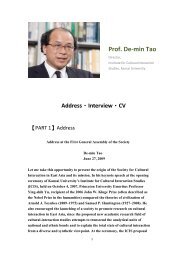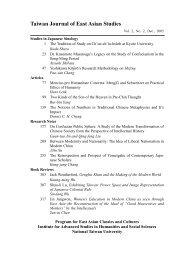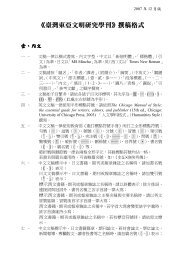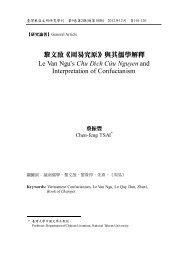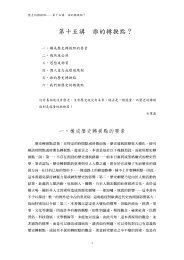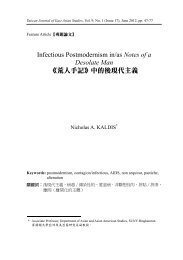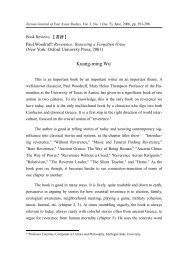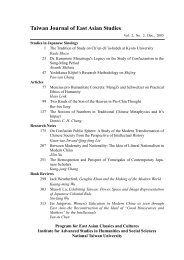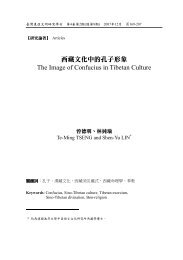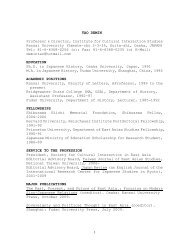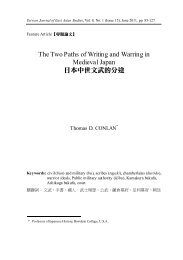臺灣東亞文明研究學刊 - 東亞經典與文化研究計畫 - 國立臺灣大學
臺灣東亞文明研究學刊 - 東亞經典與文化研究計畫 - 國立臺灣大學
臺灣東亞文明研究學刊 - 東亞經典與文化研究計畫 - 國立臺灣大學
Create successful ePaper yourself
Turn your PDF publications into a flip-book with our unique Google optimized e-Paper software.
236 Taiwan Journal of East Asian Studies, Vol. 4, No. 2 (Iss. 8), Dec., 2007<br />
turn him into a critic of the exceptionalist historical thinking of his contemporaries<br />
in England and Scotland and of the public culture of the new British state. 5<br />
Like Fletcher, Hume worked on the assumption that the modern state system<br />
had risen out of the ashes of a feudal system, emerging as a form of civilisation<br />
whose principles were still not properly understood. But whereas Fletcher had<br />
argued that feudal Europe was a form of civilisation founded on libertarian<br />
principles, Hume replied with notable sophistication and subtlety that the feudal<br />
system had been designed to extend the power of kings and had been built on<br />
principles which were bound to lead to perpetual civil war and to political<br />
disintegration. This analysis was spelled out in full in 1762 in the last chapters of<br />
his last substantial work, the History of England but it is clear from the language of<br />
his earlier essays that his thinking on this and the origins of the European state<br />
system had already taken shape in the 1740's, shortly after the publication of his<br />
philosophical masterpiece, A Treatise of Human Nature (1739-40). In an essay on<br />
'The Rise and Progress of the Arts and Sciences' (1742) Hume had made the notably<br />
proto-Montesquieuan observation that geography and climate had played a crucial<br />
role in adapting the feudal system to the conditions of different regions of Europe.<br />
He saw Europe as the most geographically diverse of all the world's continents 'the<br />
most broken by seas. rivers and mountains.' 6 It was this that explained the<br />
remarkable variety of national characteristics on display in the different countries of<br />
Europe and the various national jealousies that characterised their foreign relations.<br />
Indeed modern Europe had come to resemble the quarrelsome state system of<br />
ancient Greece which had ultimately been destroyed by national rivalries and<br />
incessant wars. On the other hand, the national jealousies which had fostered this<br />
rivalry were rooted in a spirit of emulation and competition which had made it<br />
possible for the Greeks to generate a culture which had been the glory of the ancient<br />
5 I have developed this line of thinking at greater length in Nicholas T. Phillipson, Hume (London,<br />
Weidenfeld & Nicolson, 1989), chs. 3-4.<br />
6 "The Rise and Progress of the Arts and Sciences", David Hume, Essays Moral, Political and<br />
Literary, edited by Eugene F. Miller (Indianapolis: LibertyClassics, 1987), pp. 122-123.<br />
xii



